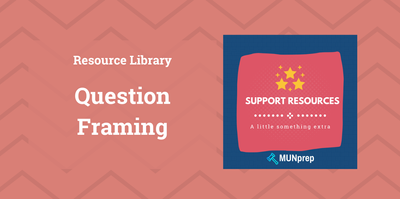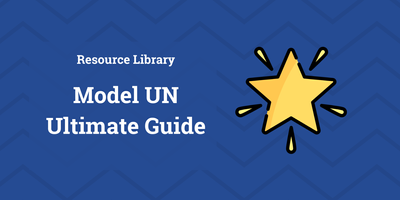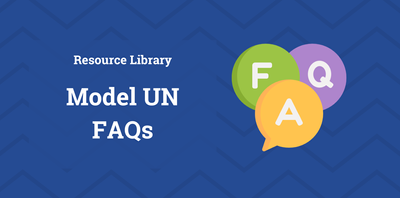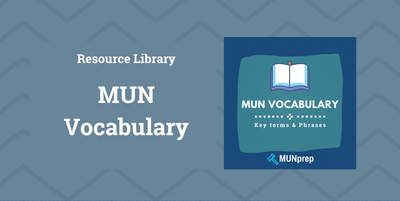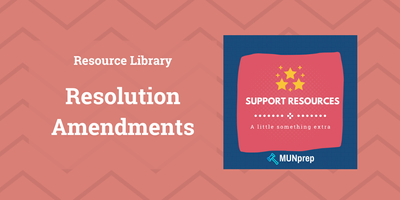UN Funding - An overview for MUN Delegates
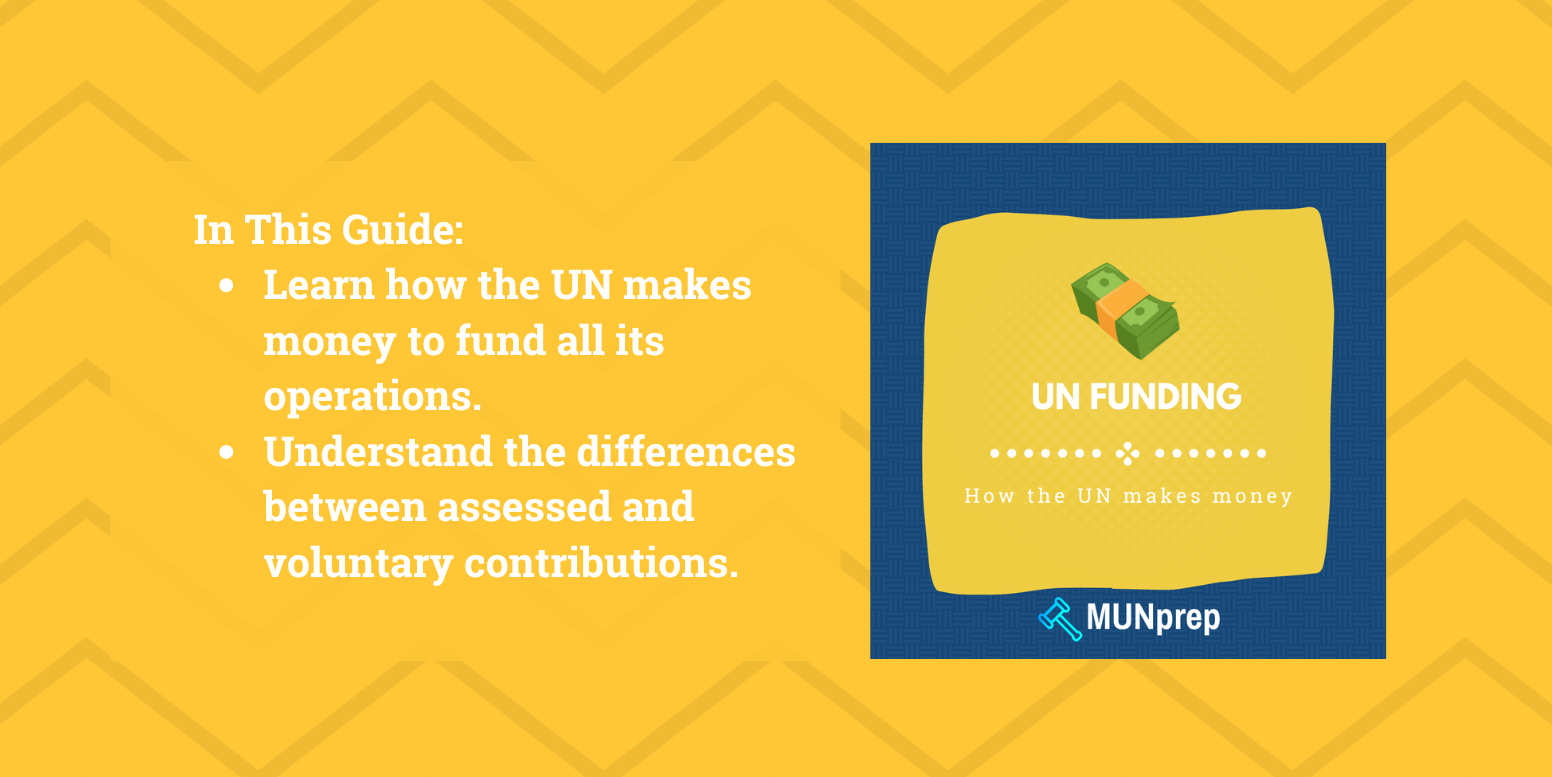
Overview of the United Nations' Funding System
The United Nations (UN) is a multifaceted organization that underpins global governance, peacekeeping, humanitarian aid, and sustainable development projects. Its work covers a number of critical functions, including conflict resolution, environmental sustainability, and human rights advocacy.
To maintain these activities, the UN relies on a well-structured funding system designed to meet its needs.
The funding mechanisms of the UN are geared to support major UN bodies like the General Assembly and the Secretariat, as well as specialized programs like UNICEF and the World Food Programme (WFP).
This guide explores how the UN secures its funding, allocates these resources to various initiatives, and offers insights for Model United Nations (MUN) delegates on leveraging this knowledge effectively in simulations and debates.
Sources of Funding for the UN
The UN’s financial backbone rests on three main pillars:
- Assessed contributions,
- Voluntary contributions, and
- Income from investments and miscellaneous sources.
Each funding source plays a unique role in ensuring the organization’s financial stability and capacity to respond to global challenges.
Assessed Contributions
Assessed contributions form the foundation of the UN’s mandatory funding and are obligatory payments made by all member states. These contributions are crucial for maintaining the organization’s core functions, including the operations of the General Assembly, the Security Council, the Secretariat, and global peacekeeping missions.
The amount each member state is required to contribute is determined by a scale of assessment that factors in a country’s Gross National Income (GNI), population size, and overall economic capacity.
This system ensures a fair distribution of financial responsibility, where wealthier nations contribute proportionally more, while developing countries pay significantly less.
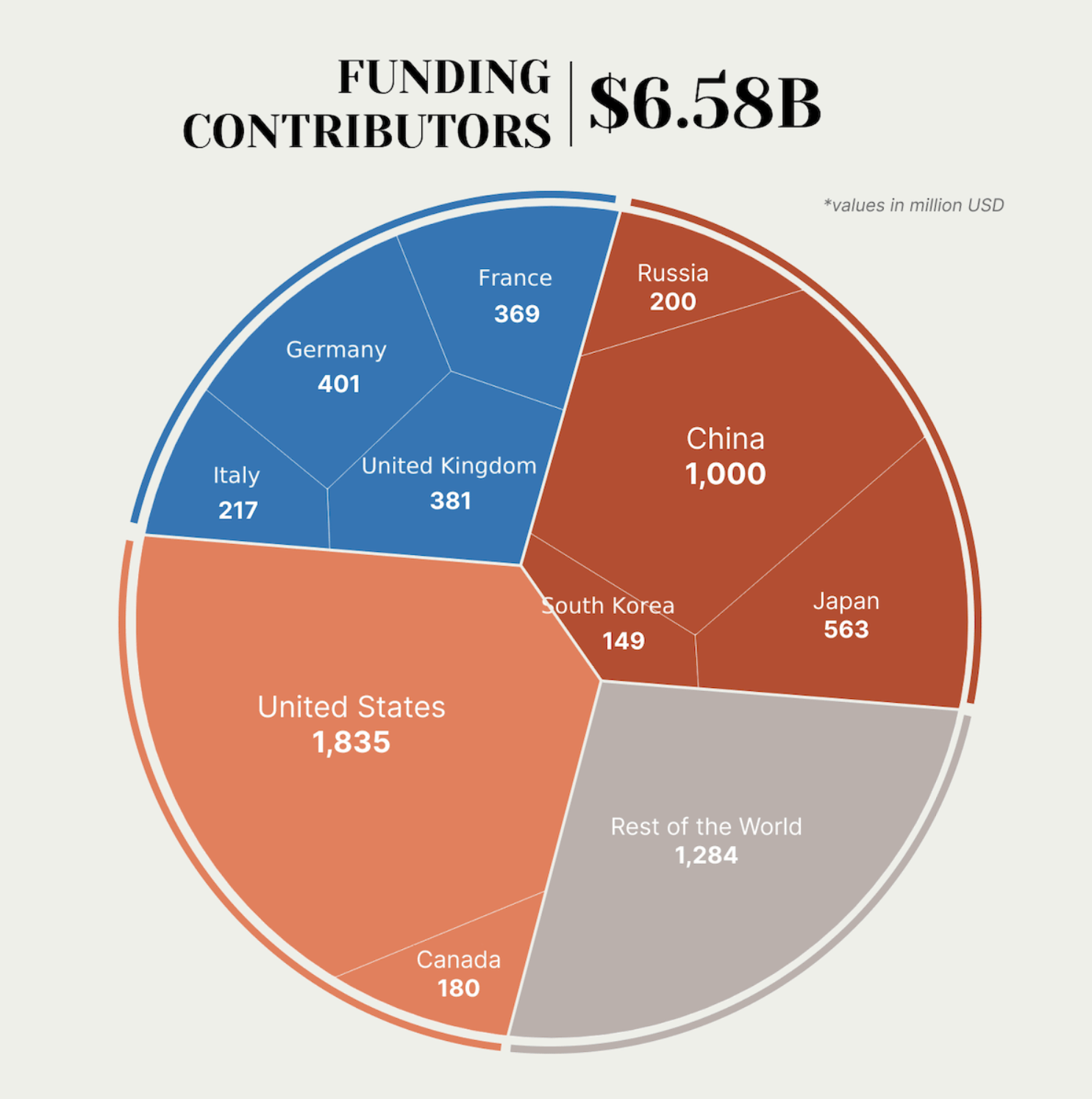
Voluntary Contributions
In addition to assessed contributions, voluntary contributions form a significant portion of the UN’s financial structure. These are non-mandatory and provided by member states, international organizations, private sector entities, and philanthropic donors.
Voluntary contributions are often earmarked for specific programs or projects, but they can also be offered as flexible funding for general use. For example, the United Nations Development Programme (UNDP) and the World Food Programme (WFP) rely heavily on such contributions to run projects targeting poverty alleviation and food security.
This type of funding is essential for the operation of specialized UN agencies. UNICEF, for example, receives over two-thirds of its budget from voluntary donations, which allows it to implement targeted initiatives like vaccination campaigns and educational programs in developing regions.
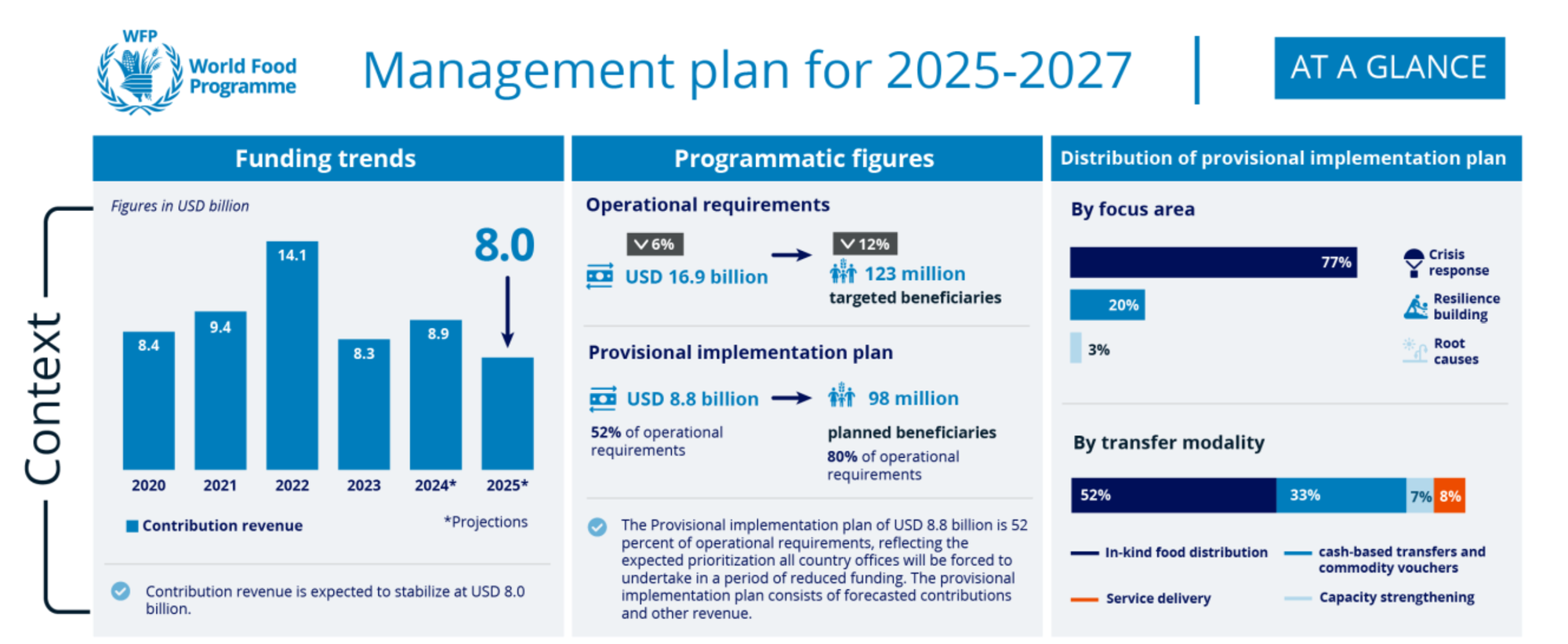
Revenue from Investments and Miscellaneous Sources
Beyond contributions from member states and donors, the UN garners additional revenue through investments, trust funds, and fees for specific services. This stream of income helps cover operational costs and sustain specific programs.
Specialized agencies might generate revenue through their partnerships and services, including training workshops, research publications, and consultancy fees. For example, the UN Institute for Training and Research (UNITAR) provides educational services that can contribute to this miscellaneous income.
Investments also play a role in the UN’s funding ecosystem. By responsibly managing funds in investment portfolios, the organization can generate returns that supplement its budget. This additional income supports administrative expenses and, in some cases, allows the UN to maintain a reserve for rapid deployment during humanitarian emergencies. The Central Emergency Response Fund (CERF), which can quickly channel funds to countries affected by natural disasters or conflict, exemplifies how such revenues support the UN’s capacity to act swiftly in times of crisis.
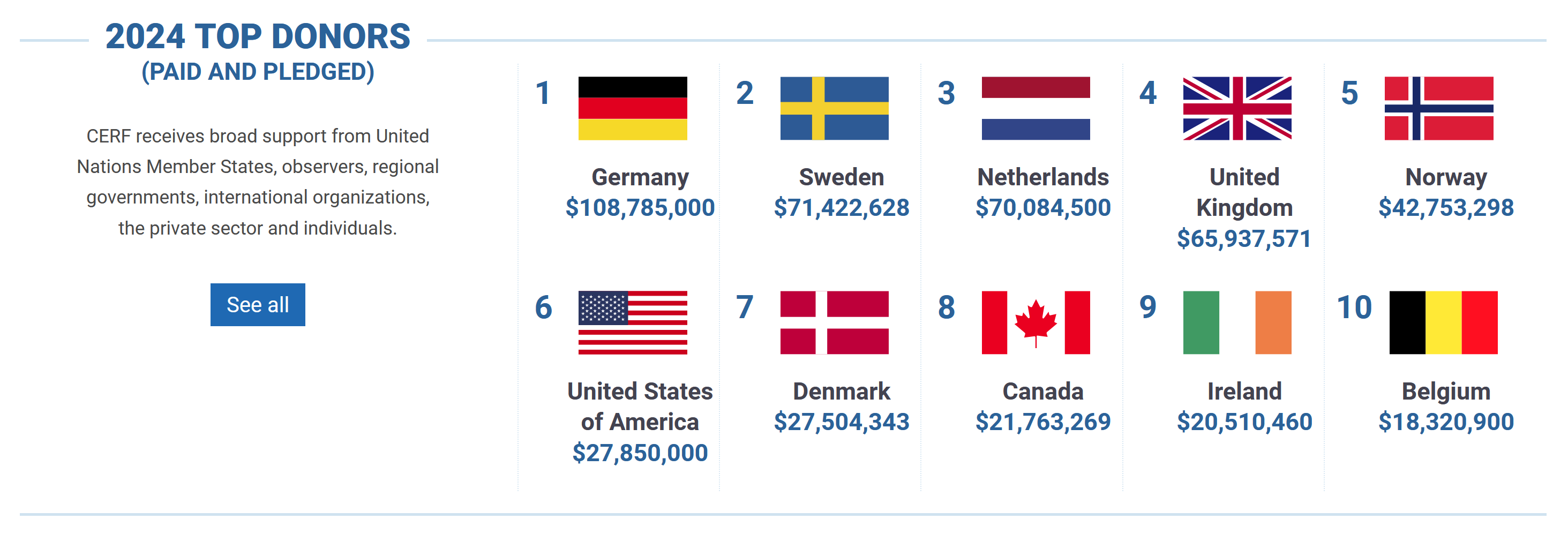
How the UN Allocates and Distributes Funds
The distribution of UN funds follows a structured and prioritized approach to ensure that critical programs receive adequate support.
The process involves a few steps:
- Budgeting and Approvals:
- Biennial Budget: The UN adopts a biennial (two-year) budget that outlines funding allocations for different sectors, from peacekeeping missions to global health initiatives.
- Approval Process: The UN General Assembly’s Fifth Committee (Administrative and Budgetary Committee) is responsible for reviewing and approving the regular budget. Recommendations are proposed by the Secretary-General and debated before approval.
- Disbursement to Programs and Operations:
- Core Operations: The regular budget supports the functioning of major bodies such as the UN Secretariat and General Assembly.
- Peacekeeping Operations: Separate budgets are created for peacekeeping, funded by assessed contributions from member states, with a different assessment scale that takes into account a member state's capacity to pay.
- Specialized Agencies and Funds: Programs like the UNDP, UNICEF, and WFP rely heavily on voluntary contributions. Allocation is based on needs assessments, project scopes, and donor conditions.
- Emergency Funds: The UN also maintains reserves for rapid deployment in crisis situations. For example, the Central Emergency Response Fund (CERF) can quickly allocate funds to respond to natural disasters and humanitarian emergencies.
- Auditing and Oversight:
- Internal Oversight: The Office of Internal Oversight Services (OIOS) ensures that funds are used effectively and transparently.
- External Audits: Independent bodies, such as the Board of Auditors, review the UN's financial statements annually to maintain transparency and accountability.
Challenges in Funding and Allocation
Despite the UN’s structured approach to funding and allocation, significant challenges persist, complicating its ability to operate efficiently and respond flexibly to global needs. One primary challenge is the dependence on major donors.
Centralized Control
The UN often relies heavily on substantial contributions from a handful of wealthy member states, such as the United States, China, and European countries. This dependence creates vulnerabilities; if these nations decide to reduce their funding due to economic pressures, shifting political priorities, or disputes over UN policies, the organization’s financial stability can be compromised.
For example, when the U.S. has temporarily withheld or reduced funding in response to certain UN actions, it has triggered budget shortfalls that impact program delivery and planning.
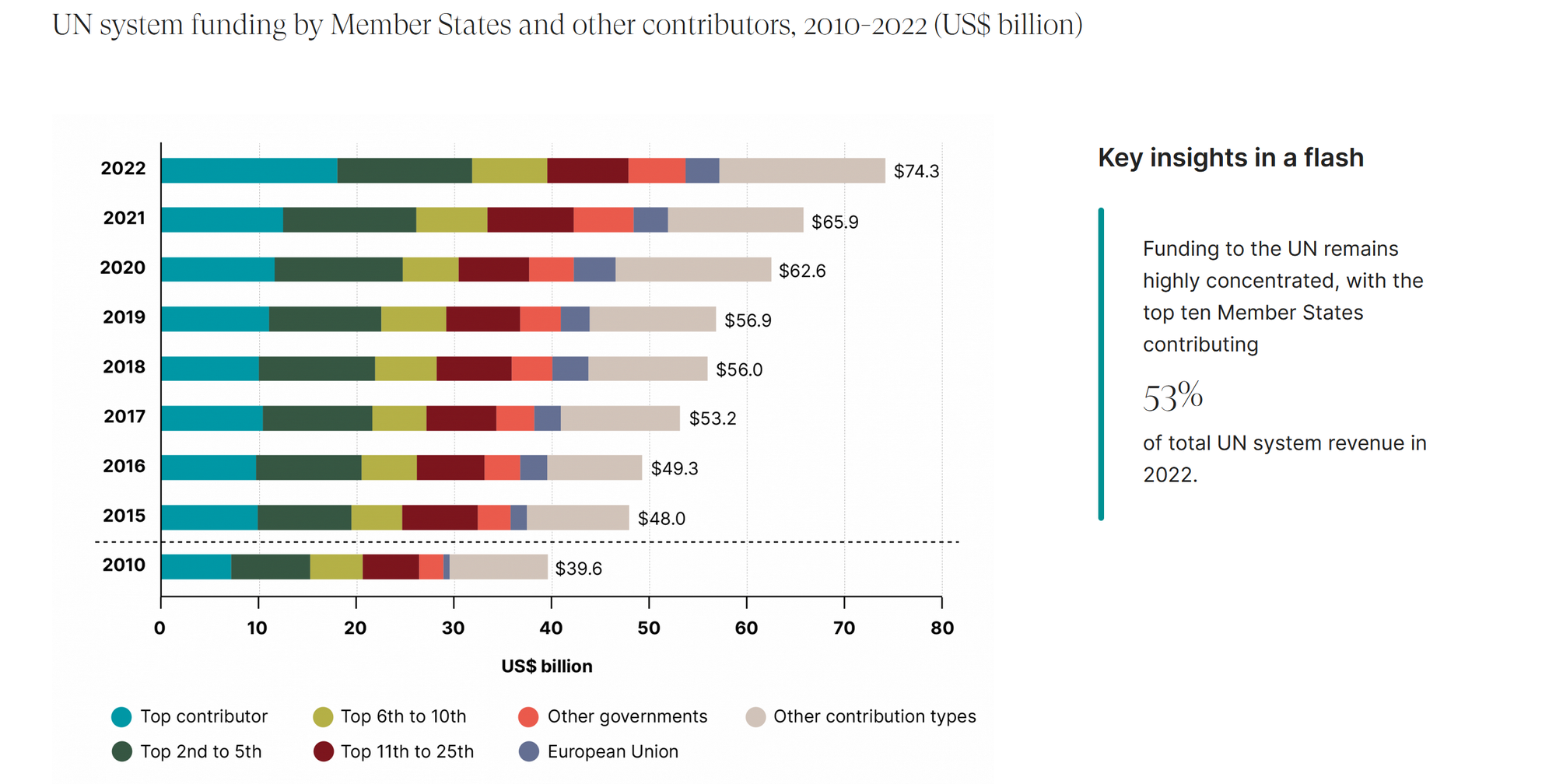
Difficulties in Budget Negotiations
Budget constraints represent another significant challenge. Approving the UN’s biennial budget requires extensive negotiation among member states, and political disagreements can delay this process.
These delays can stall essential program implementation and disrupt ongoing peacekeeping missions, humanitarian efforts, and development projects. For instance, disputes within the General Assembly over budget allocation priorities can create a bottleneck that delays funding for crucial operations, affecting regions that depend on timely UN assistance.
Using this information in Model UN
MUN delegates can greatly benefit from understanding the intricacies of the UN’s funding and distribution systems. Armed with this knowledge, they can craft realistic proposals and engage in more impactful negotiations during simulations.
Better Resolution Writing
Strategize Resolutions: Crafting resolutions that propose detailed and feasible funding mechanisms can make a delegate’s position more compelling. For instance, resolutions might suggest establishing new trust funds to pool resources for specific themes like climate resilience or pandemic preparedness.
Delegates could also recommend increased voluntary contributions from member states and partnerships with NGOs and private donors to bolster funding diversity. Collaboration with prominent international NGOs, such as Oxfam or Save the Children, could be suggested as a strategy to secure additional resources and tap into established humanitarian networks.
Using Case Studies
Referencing actual case studies can enhance the credibility of arguments and solutions proposed in MUN sessions. For example, delegates might cite the Central Emergency Response Fund (CERF) as a model of rapid-response funding that enables the UN to mobilize resources quickly during emergencies.
Highlighting the success of CERF in recent crises demonstrates how flexible funding is instrumental in effective global response efforts. Additionally, delegates could propose measures to improve financial oversight and transparency, such as enhanced audits or regular financial reporting, to appeal to countries that prioritize accountability in funding.

